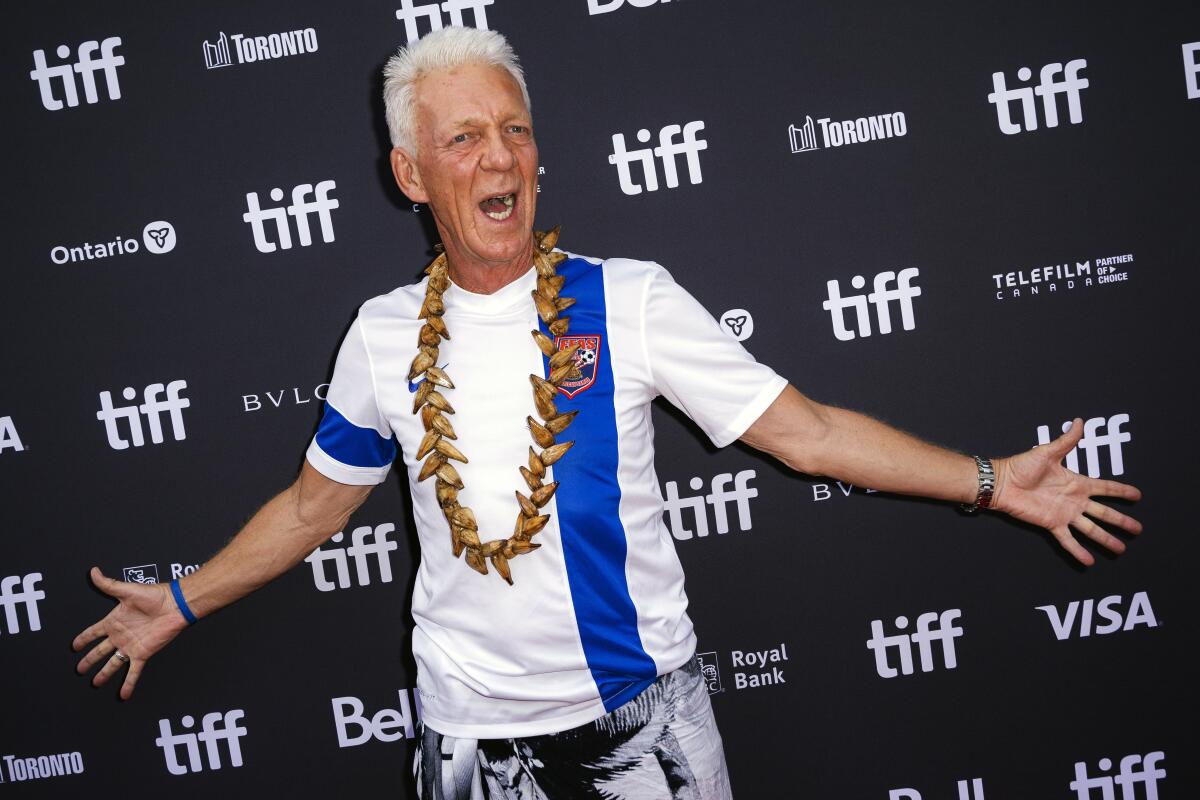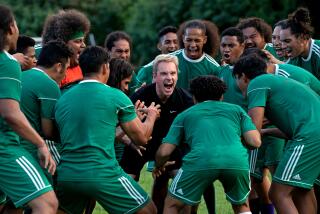Is truth better than fiction? Thomas Rongen’s story loses something in ‘Next Goal Wins’

- Share via
Spoiler alert: The following column reveals plot details from the film “Next Goal Wins.”
Thomas Rongen has packed a lot of soccer into his 67 years.
He played for 11 teams and coached for a dozen more. He was there for the end of the NASL, the start of MLS and birth of Chivas USA. With the L.A. Aztecs he played alongside Johan Cruyff and against Franz Beckenbauer and he won titles on multiple levels, from high school to the pros.
If he isn’t U.S. soccer royalty, he’s certainly part of the noble class.
But what he will be forever remembered for is taking American Samoa, the worst team in the world, to a World Cup qualifying victory so improbable it inspired two movies — both of which we’ll get to in a bit.
“It was bigger than any ring I’ve won or any trophy I’ve lifted as a player or as a coach,” Rongen, now mostly retired from coaching and working as a TV analyst for CBS and Inter Miami, the MLS club for which Lionel Messi plays, said of his Samoan adventure.
A decade earlier American Samoa had lost to Australia 31-0 in a World Cup qualifier, still the most one-sided result in international soccer history. The team would go winless for another 10 years — its only victory in 39 tries came in 1983 — by the time Rongen got a phone call from Sunil Gulati, president of the U.S. Soccer Federation.
“He says, we have a territory called American Samoa and I’m sitting in a bar and I look at my buddy, and I go, ‘Wait, where’s American Samoa?’,” Rongen remembered.

Where it was was at the bottom of the FIFA rankings, the worst team in the world. When Rongen got there, he had just three weeks to prepare a rag-tag team of part-time players for a new round of qualifiers ahead of the 2014 World Cup.
“My big challenge, obviously, was how to [repair] a losing mentality,” he said. “Because they expected to lose, it’s just a matter of can we lose by less than 20?”
That he succeeded — American Samoa beat Tonga 2-1 and tied the Cook Islands before being eliminated in a 1-0 loss to Samoa — is just part of the story. Of more interest is how he succeeded and whether the coach or the team got more out of the experience.
Like the team he was about to coach, Rongen had hit rock bottom by the time he landed in American Samoa. Years earlier his 19-year-old stepdaughter Nicole, a freshman soccer player at Virginia Commonwealth, died in a single-car accident on I-64 in Goochland County, Virginia. Rongen was devastated.
“I never mourned properly,” said Rongen, who felt so guilty he considered suicide on more than one occasion.
In American Samoa, he was forced to confront his loss in a different way. Every afternoon, he found, the island virtually shuts down for five minutes of spiritual reflection and prayer, a ritual Rongen, an atheist, had no use for. Or so he thought.
“By the third day, I absolutely break down,” he said. “I’m able to let go and shed everything and finally can think about my daughter with a smile on my face. That’s why that became an incredible personal journey. If it wasn’t for American Samoa, I probably would not have been talking to you right now.”
Movie review: Filmmakers score with understated look at a collective spirit and openhearted determination of the American Samoa soccer team.
If it wasn’t for American Samoa, it’s probable no one would be interested in talking to him right now. But after being healed by the island, Rongen set out to heal the island’s national team. And one of his first moves was to reach out to Nicky Salapu, the goalkeeper who gave up the 31 goals to Australia.
“I was thinking maybe I’ll bring him in as an assistant coach. It might be a good journey for him,” Rongen said. “Then in the conversation, he goes, ‘Walking the streets, people still recognize me. And my son thinks I’m a failure. I play Australia at least five times a week alone on my Xbox. I beat them 32-0 every game.’
“I knew there was trauma. So I convinced him to come back and play again.”
Fifty minutes after the win over Tonga, Rongen said Salapu came up to him crying; his son had just told him he was a hero. Salapu would become American Samoa’s team captain and play another eight years, becoming the national team leader in appearances.
Rongen also had to heal with the trauma surrounding defender Jaiyah Saelua, a fa’afafine, or third gender, in Polynesian society. The team’s previous white coaches insisted on calling her Johnny, her birth name and the one on her passport.
The Dutch coach doesn’t speak fluent Spanish, but he says he’s excited for the chance to take over the newest MLS team in Los Angeles.
In front of her teammates, Saelua asked again to be called Jaiyah, only to get an unexpected answer from Rongen.
“Yes, absolutely,” he said. “You’re Jaiyah.”
The whole team embraced her. The first nonbinary player to compete in a FIFA World Cup qualifier, Saelua not only became a starter for Rongen, but her late-game clearance off the line saved the win over Tonga.
“Those are the little things that made it so rewarding,” said Rongen, a jut-jawed Dutch native who has spent the past 44 years in the U.S. “It was the most gratifying and best professional journey I ever went on.”
(Rongen’s teachings apparently didn’t stick. American Samoa lost its first game in the Pacific Games on Monday and has been outscored 31-1 in its last three matches, all losses.)
All this is relevant again because Rongen’s journey with American Samoa, first told in Mike Brett and Steve Jamison’s brilliant 2014 British documentary “Next Goal Wins,” is being retold in a comedy-drama of the same name, co-written and directed by Oscar winner Taika Waititi (“JoJo Rabbit,” “Thor: Ragnarok”). The film, which hit theaters last Friday, has all the quirky touches expected of a Waititi movie — the man turned Hitler and the Nazis into buffoons in “JoJo Rabbit” — but the true-life Rongen does not fare well.
He’s portrayed by Michael Fassbender as ungrateful and bitter, a chair-throwing alcoholic who is separated from his wife, initially pushes Saelua to quit the team and struggles to convince Salapu to play for him. It’s an unfortunate and unnecessary bit of dramatic license because, for many, the movie will be their introduction to Rongen, who is about as far from Fassbender’s washed-up loser as Hitler was from the character Waititi played in “JoJo Rabbit.”

But the New Zealand-born Waititi wanted his version of “Next Goal Wins” to be a paean to his Polynesian culture and he needed an unlikable villain as a foil for the welcoming, laid-back Samoans. His film, Waititi says at the beginning, may have been inspired by a true story, but he has made “a few embellishments along the way.”
“The documentary is a brilliant piece in itself,” Waititi told Soccer America’s Scott French. “For me to tell any story — to adapt a book even — I allow myself the ability to change whatever I want, to make it suitable to the style of storytelling that I do and to make the films that I make.
“If you want the true story, watch the doc. It’s brilliant. My film is a type of version [of that story].”
If Rongen is disappointed by Waititi‘s film, which includes a poignant acknowledgement of his stepdaughter’s passing, he isn’t saying so publicly. But he is wondering about certain things.
The first time he saw it, he said, he was alone in an empty theater and he was baffled.
“I said, ‘Why did you change so many things?’ It’s still wonderfully done,” he confessed. “It’s such an uplifting comedy-drama.”
That may be. But it’s not the uplifting story Rongen lived. For that there’s the documentary, scheduled to become available on Apple, Google and Amazon on Friday and on Vudu beginning Dec. 1.
⚽ You have read the latest installment of On Soccer with Kevin Baxter. The weekly column takes you behind the scenes and shines a spotlight on unique stories. Listen to Baxter on this week’s episode of the Corner of the Galaxy podcast.
More to Read
Go beyond the scoreboard
Get the latest on L.A.'s teams in the daily Sports Report newsletter.
You may occasionally receive promotional content from the Los Angeles Times.






